
Los Borrachos Velazquez YouTube
Jusepe (José) de Ribera, The Martyrdom of Saint Philip, 1639, oil on canvas, 92 x 92 in. (234 x 234 cm), (Museo Nacional del Prado, Madrid) Speakers: Dr. Beth Harris, Dr. Steven Zucker The English Romantic poet, Lord Byron, wrote that the artist, "Spagnoletto [the little Spaniard] tainted/His brush with all the blood of all the sainted" (Don.

Arte en el Aula Velázquez. " Los borrachos" y " La fragua de Vulcano"
The Triumph of Bacchus (Greek title is Ο Θρίαμβος του Βάκχου) is a painting by Diego Velázquez, now in the Museo del Prado, in Madrid. It is popularly known as Los borrachos or The Drinkers (politely, also The Drunks ). Velázquez painted The Triumph of Bacchus after arriving in Madrid from Seville and just before his voyage to Italy.

Diego Velázquez Los Borrachos Blog iDNES.cz
Los Borrachos Dr. Beth Harris and Dr. Steven Zucker provide a description, historical perspective, and analysis of Velázquez's Los Borrachos (The Drunks) or The Triumph of Bacchus. Diego Rodríguez de Silva y Velázquez, Los Borrachos (The Drunks) or The Triumph of Bacchus, 1628-29, 165 × 225 cm, (Museo Nacional del Prado, Madrid).

“Los Borrachos” by Velázquez —“Los Borrachos” (“The Drunks”) or “The Triumph of Bacchus” by Dieg
It is popularly known as Los borrachos or The Drinkers (politely, also The Drunks). Velázquez painted The Triumph of Bacchus after arriving in Madrid from Seville and just before his voyage to Italy. The work was painted for Philip IV, who paid Velázquez 100 ducats for it. The painting shows Bacchus surrounded by drunks.

Los borrachos Fundación Goya en Aragón
Velázquez, Los Borrachos or the Triumph of Bacchus Velázquez, Vulcan's Forge Velázquez, The Surrender of Breda Velázquez, Las Meninas Velázquez, Las Meninas Zurbarán, The Martyrdom of Saint Serapion Ribera, Martyrdom of Saint Philip Jerónimo de Balbás, Altar of the Kings (Altar de los Reyes) Making a Spanish polychrome sculpture
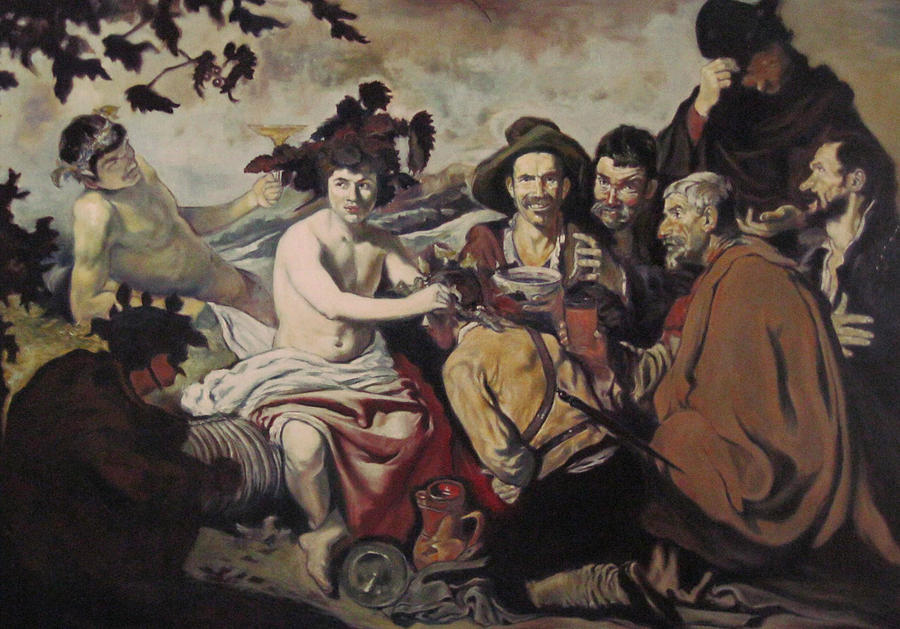
Los Borrachos Or The Drinkers Painting by Michael Charles FargoAfter Diego Velazquez
Velázquez, Los Borrachos or the Triumph of Bacchus. Velázquez, Vulcan's Forge. Velázquez, The Surrender of Breda. Velázquez, Las Meninas.. Velazquez's The Surrender of Breda revolutionized the genre of military painting precisely by emphasizing that to win with elegance and magnanimity is what defines a great leader,.
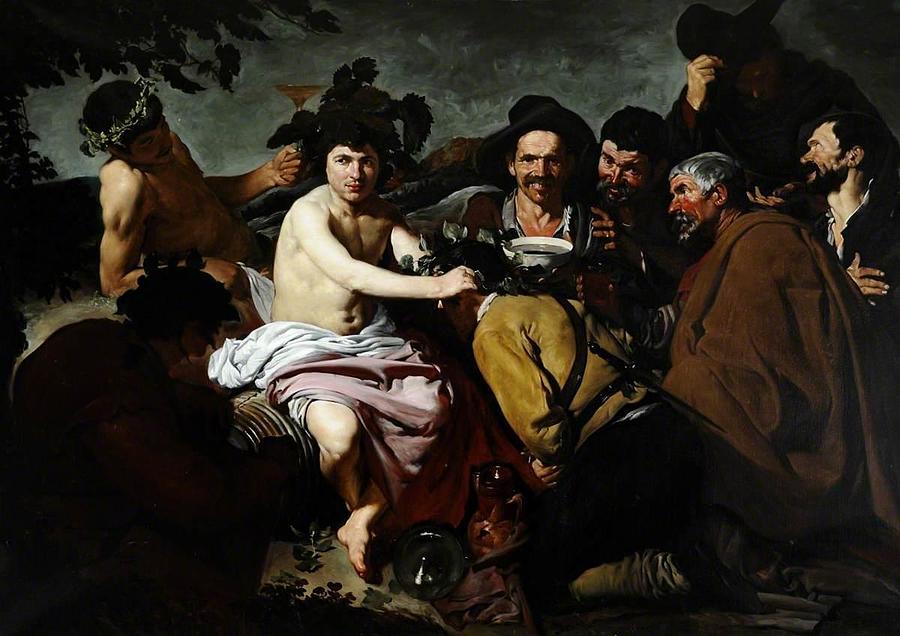
The Triumph of Bacchus Los Borrachos Painting by Diego Velazquez Pixels
Diego Rodríguez de Silva y Velázquez, Los Borrachos (The Drunks) or The Triumph of Bacchus, 1628-1629, 165 x 225 cm (Museo Nacional del Prado, Madrid). Speakers: Dr. Beth Harris and Dr. Steven Zucker. Created by Beth Harris and Steven Zucker. Questions Tips & Thanks Want to join the conversation? Sort by:
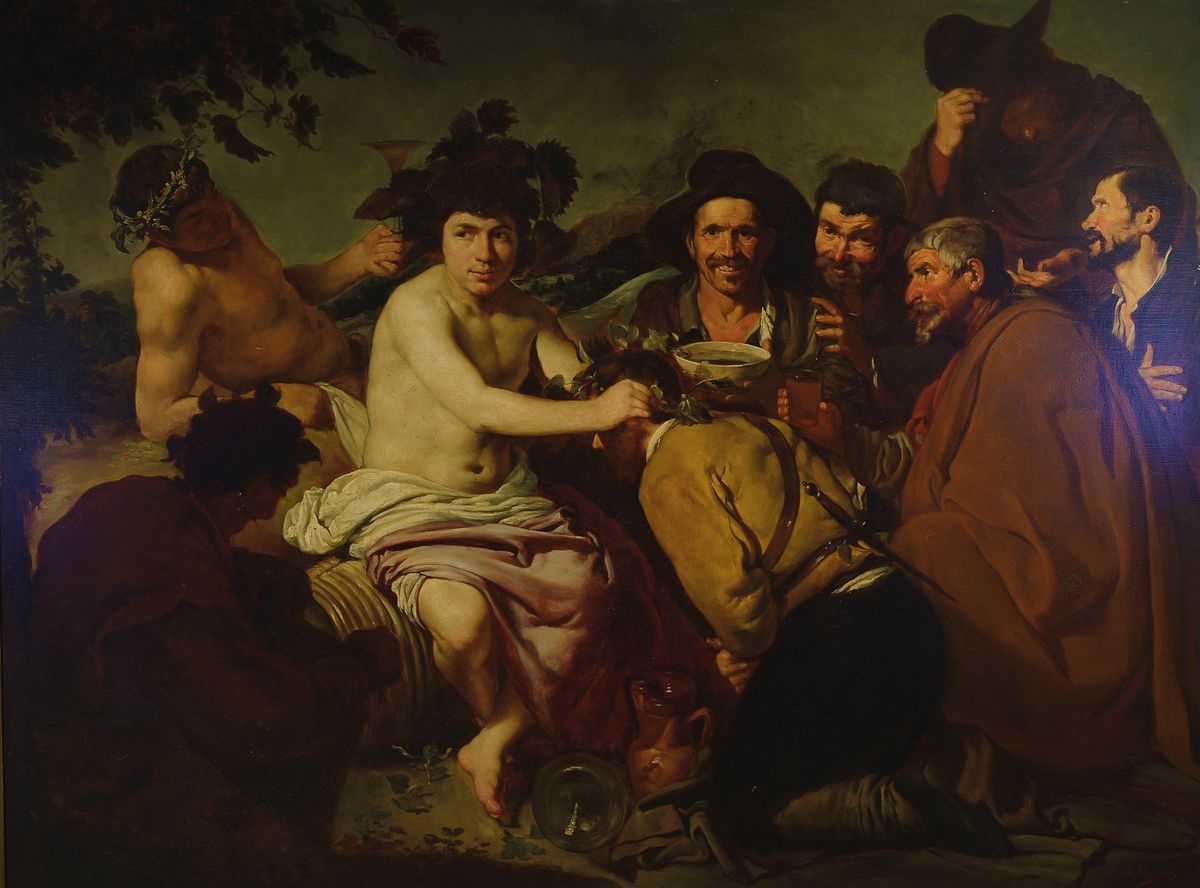
Diego Velázquez Los Borrachos or the triumph of Bacchus in the Museo Prado Madrid MutualArt
El triunfo de Baco es una pintura del español Velázquez, creada en 1629 y conservada en el Museo del Prado. 1 Es conocida popularmente como Los borrachos. El cuadro lo pintó unos cinco años después de su llegada a Madrid procedente de Sevilla, y poco antes de su primer viaje a Italia.

HISTORIA DEL ARTE temas, imágenes y comentario VELAZQUEZ. El triunfo de Baco o los Borrachos.
Fuente: Museo Nacional del Prado. Los borrachos, o El triunfo de Baco. 1628 - 1629. Óleo sobre lienzo, 165 x 225 cm Sala 010. El pago, en julio de 1629, de 100 ducados a por cuenta de una pintura de que había hecho para el rey nos informa sobre la fecha aproximada de la obra e identifica a su destinatario. Estamos en las vísperas del primer.
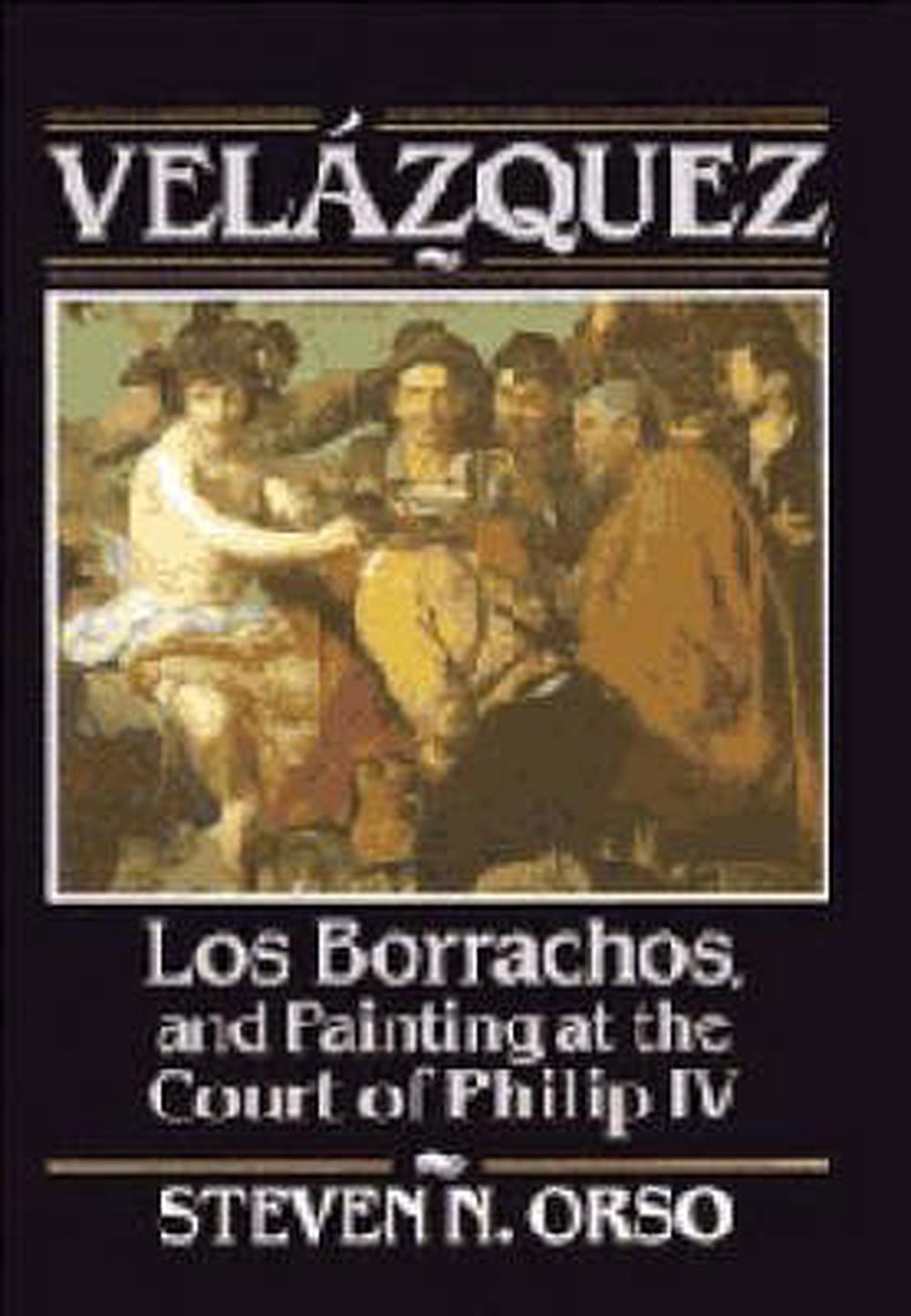
Velazquez, Los Borrachos, and Painting at the Court of Philip IV by Steven N. Orso, Hardcover
Watch on. Diego Rodríguez de Silva y Velázquez, Los Borrachos (The Drunks) or The Triumph of Bacchus, 1628-1629, 165 x 225 cm (Museo Nacional del Prado, Madrid). Speakers: Dr. Beth Harris and Dr. Steven Zucker. Created by Beth Harris and Steven Zucker. Content produced by: SmartHistory.

Javier Hoyos Lizarraga LOS BORRACHOS VELAZQUEZ
Diego Rodríguez de Silva y Velázquez, Los Borrachos (The Drunks) or The Triumph of Bacchus, 1628-1629, 165 x 225 cm (Museo Nacional del Prado, Madrid). Speak.

Arte en el Aula Velázquez. " Los borrachos" y " La fragua de Vulcano"
Observing Velazquez biography. From early years to education, personal life and style development.. Los borrachos (the drunks) or Los bebedores (the drinkers), who are paying mock homage to a half-naked ivy-crowned young man seated on a wine barrel. The painting is firm and solid, and the light and shade are more deftly handled than in.

Diego Rodríguez Velázquez The Triumph of Bacchus (Los Borrachos, The Topers) Detail c. 1629
The Feast of Bacchus (The Triumph of Bacchus; The Drinkers; The Drunks; Los borrachos) Velázquez - El Triunfo de Baco o Los Borrachos (Museo del Prado, 1628-29).jpg Artist Diego Velázquez Year 1628-1629 Medium Oil on canvas Dimensions 165 cm × 225 cm (65 in × 89 in) Location Museo del Prado, Madrid

LOS BORRACHOS EL TRIUNFO DE BACO Autor Diego Velazquez Año 1628 1629 Técnica Óleo sobre
The Triumph of Bacchus (Greek title is Ο Θρίαμβος του Βάκχου) is a painting by Diego Velázquez, now in the Museo del Prado, in Madrid. It is popularly known as Los borrachos or The Drinkers (politely, also The Drunks ). Velázquez painted The Triumph of Bacchus after arriving in Madrid from Seville and just before his voyage to Italy.
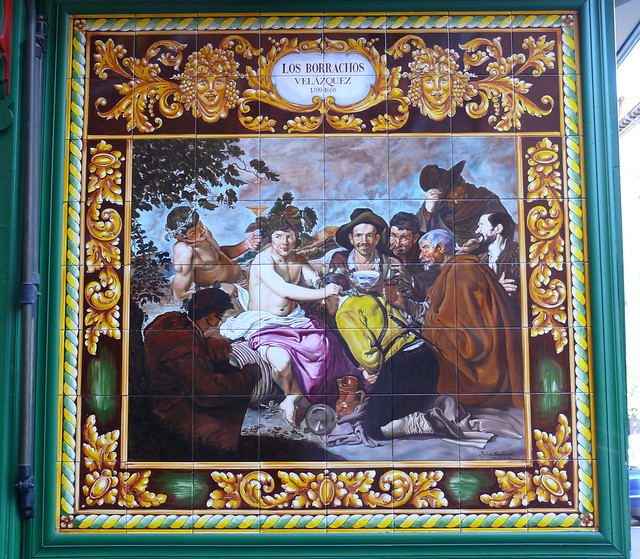
Los borrachos de '' Velázquez '' Flickr Photo Sharing!
An alternate Spanish title for the painting is Los Borrachos or "The Drunks" and it was painted for Philip IV who hung it in his summer bedroom. The scene is a depiction of Bacchus, or Dionysis, the god who rewards men with wine, temporarily releasing them from their problems.. Velazquez's last major work was a group portrait of the Spanish.
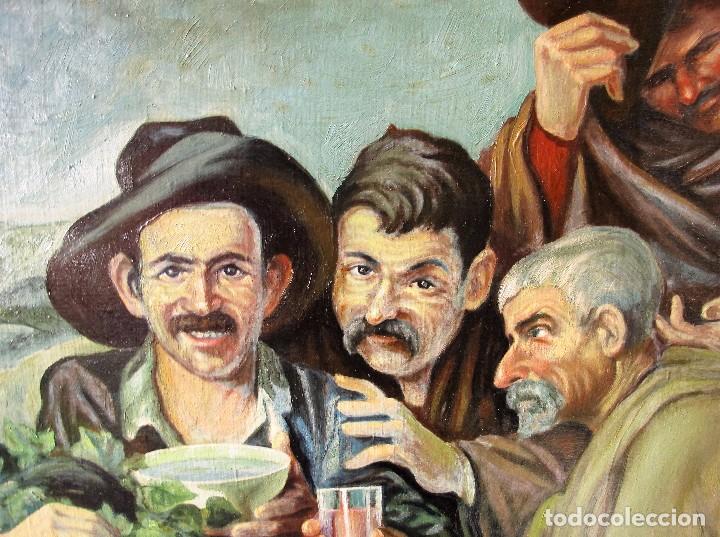
oleo original los borrachos copia de velazque Comprar Pintura al Óleo Moderna sin fecha
by Dr. Beth Harris and Dr. Steven Zucker Diego Rodríguez de Silva y Velázquez, Los Borrachos (The Drunks), also known as The Triumph of Bacchus, 1628-1629, 165 x 225 cm (Museo Nacional del Prado, Madrid)